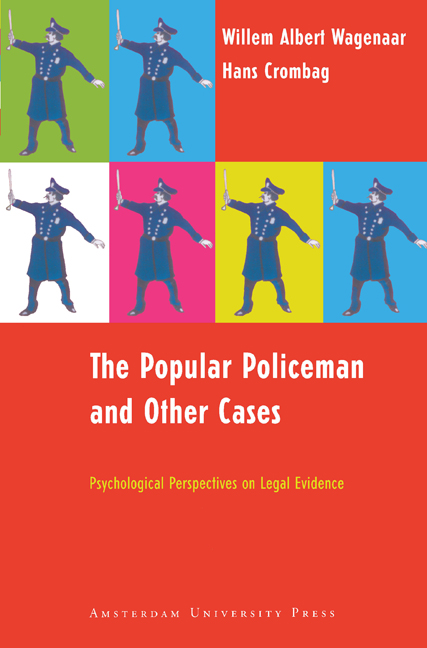Book contents
- Frontmatter
- Contents
- Foreword
- 1 Illegal Gambling or the Victory Travel Club
- 2 On Causal Reasoning or Death in the Warmoesstraat
- 3 Consumer Confusion or Potato Chips and Olive Oil
- 4 Fiction and Reality of ‘the Average Individual’ or the Case of Old Mr. Lane
- 5 Case Histories and Scientific Proof or the Case of JR
- 6 Not a Good Story or the Disappearance of Maddy and Vicky
- 7 Conflicting Scenarios or the Case of the Man who Needed a Companion
- 8 Two Processes Obstructing the Accuracy of Long-Term Memory or the Case of the Stolen Mercedes
- 9 Confessions after Repeated Interrogation or the Putten Murder Case
- 10 Collaborative Storytelling or the Artist’s Models and an Angry Neighbourhood
- 11 Allegation of Sexual Child Abuse in a Case of Disputed Visitation or Cindy's Story
- 12 Psychogenic Amnesia or the Case of the Amnesic Strangler
- 13 Obeying Reflexes or Death on the Climbing Wall
- 14 Visual Acuity or Shooting Mimi the Cat
- 15 Sexual Semiotics or the Case of the Popular Policeman
- Postscript: Psychological Expertise and the Law
- Bibliography
- Name Index
- Subject Index
14 - Visual Acuity or Shooting Mimi the Cat
Published online by Cambridge University Press: 16 February 2021
- Frontmatter
- Contents
- Foreword
- 1 Illegal Gambling or the Victory Travel Club
- 2 On Causal Reasoning or Death in the Warmoesstraat
- 3 Consumer Confusion or Potato Chips and Olive Oil
- 4 Fiction and Reality of ‘the Average Individual’ or the Case of Old Mr. Lane
- 5 Case Histories and Scientific Proof or the Case of JR
- 6 Not a Good Story or the Disappearance of Maddy and Vicky
- 7 Conflicting Scenarios or the Case of the Man who Needed a Companion
- 8 Two Processes Obstructing the Accuracy of Long-Term Memory or the Case of the Stolen Mercedes
- 9 Confessions after Repeated Interrogation or the Putten Murder Case
- 10 Collaborative Storytelling or the Artist’s Models and an Angry Neighbourhood
- 11 Allegation of Sexual Child Abuse in a Case of Disputed Visitation or Cindy's Story
- 12 Psychogenic Amnesia or the Case of the Amnesic Strangler
- 13 Obeying Reflexes or Death on the Climbing Wall
- 14 Visual Acuity or Shooting Mimi the Cat
- 15 Sexual Semiotics or the Case of the Popular Policeman
- Postscript: Psychological Expertise and the Law
- Bibliography
- Name Index
- Subject Index
Summary
In most legal systems, eyewitness testimony is limited to what eyewitnesses have perceived directly. Hearsay, guesses, inferences, logical conclusions – no matter how compelling – are excluded as evidence. The rationale seems to be that direct perception and the recollection of it are more reliable than more complex cognitions. Still, there are limits to the precision of human perception and to the recollection of what was perceived. There are good reasons to scrutinise eyewitness testimony even if it is limited to direct perception. The case of Mimi the cat is an apt illustration of how an apparently simple report of what two witnesses saw may contain a wealth of perceptual problems.
The case
On the morning of 1 May 2004, two witnesses reported to the police that a Mr. Church, well known to them, had shot at Mrs. Edgewood's cat Mimi, also well known to them. The witnesses were two Polish seasonal labourers, working on the land of a Mr. Bundy. It was 5.50 AM, twenty minutes before sunrise. They were standing at about 120 metres from the road which runs on top of a small dyke in the polders. They saw a grey Peugeot on that road, being driven by Mr. Church. The Peugeot stopped, the window was rolled down, and the double barrel of a shotgun was pointed out. They saw Mrs. Edgewood's cat Mimi sitting at a distance of about ten metres from the car, on the sloping bank of a ditch. Mr. Church aimed at the cat and fired. The cat ducked and ran away.
This testimony was later corroborated by Mrs. Edgewood, who declared that subsequently Mimi was missing for two entire weeks and then returned home with a scratch on her left paw .Mr. Church denied the accusation, saying that he had been in bed at that particular time, which was confirmed by Mrs. Church. He did not deny, however, that he was an avid hunter, owned a hunting licence and a shotgun, and entertained a habit of hunting in the early morning.
Mr. Church was formally accused of animal abuse, a serious offence carrying a maximum sentence of two years´ imprisonment. For Mr. Church the case was even more serious, because since he had taken early retirement, he had made hunting his major occupation.
- Type
- Chapter
- Information
- The Popular Policeman and Other CasesPsychological Perspectives on Legal Evidence, pp. 227 - 234Publisher: Amsterdam University PressPrint publication year: 2012



